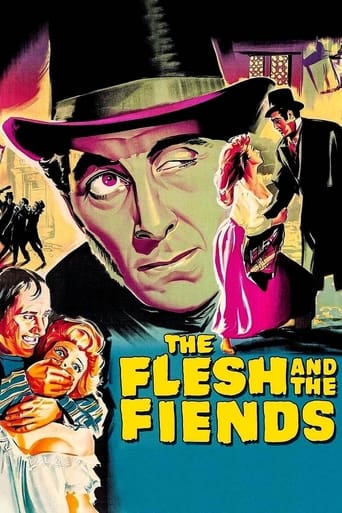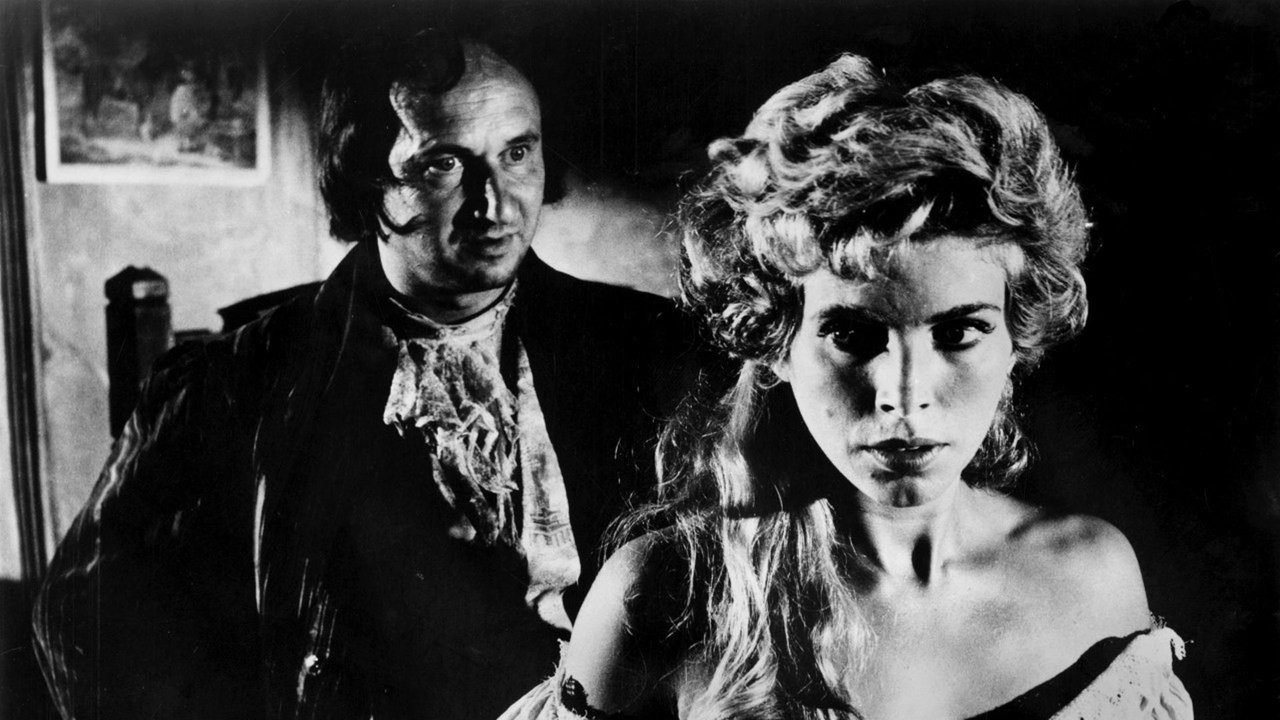Panamint
An excellently made and acted British film that retells the true story of the Burke and Hare horrors of the 19th century. An atmosphere of old Edinburgh is effectively evoked to enhance the brutal tale. And brutal it is, as was the actual true story.This is certainly one of Peter Cushing's finest performances. He is totally focused, energetic and delivers a fascinating characterization of his aristocratic, hypocrite-defying, unintentionally cruel and very determined Doctor Knox. He is not at all Doctor Frankenstein in this film- he is Doctor Knox.Donald Pleasance is chilling as the sociopath Burke. This is one of the performances that made him almost a cult actor way back in the 1960's, which is when I began to notice and seek out his film work. There is almost no way to describe British stage and film actress Billie Whitelaw's work in this film except to say that it is so powerful that she bursts from the screen. One of the most impactful actors ever to appear in film, she performs with a high level of skill and force, almost going over the top as necessary to portray her loud low-class character trapped in a downtrodden life. A violent film depicting a brutal era and the unsavory days when medicine began to stumble ahead toward modernity, this film is the real deal, solidly and seriously produced with ability and skill by everyone involved.
Prichards12345
The Flesh And The Fiends gives us the oft-told story of Burke And Hare - with a surprising amount of accuracy and some excellent performances.First of all we have Peter Cushing as Dr. Knox, a somewhat ruthless medical lecturer who is not exactly scrupulous as to where he gets his bodies for medical dissection. And it's a tribute to the mighty Cushing that his Knox is utterly different from his Baron Frankenstein. He gives a layered and fascinating performance, only at the end of the movie displaying a conscience in a marvellous scene with a street gamin.And in George Rose and Donald Pleasence we have a Burke and Hare to savour. True their accents are not exactly authentic but the mixture of callous cunning and rank stupidity they display has never been bettered. Pleasence in particular is a delight as the cowardly Hare. And then there's the excellent Billie Whitelaw - years before The Omen - giving an erotically charged turn as the girlfriend of a young medical student at Knox's academy.The film itself recreates 1820's Edinburgh brilliantly, and is superbly photographed. John Gilling, later responsible for the Hammer classic Plague of The Zombies, directs with a sure hand. The budget appears somewhat higher than your average 50s British horror movie - some well stocked crowd scenes are included here. The film doesn't stint on the horror, either. Perhaps the only real fault is the occasional lag in pace - the 95 minute running time could possibly have done with some slight trimming here and there. All told this is a splendidly realised and watchable horror drama.
flapdoodle64
This is a classic example of the way a small budget film can be much more enjoyable than big budget affairs, provided the right people work on it. This film has everything going for it in terms of creative personnel, at least in regard to the direction, writing and acting.The claustrophobic and minimalist sets, the seedy-looking costumes and the venal and petty motivations of various characters successfully evoke the bitter world of the impoverished citizens of the British Empire. Drama is provided at the nexus where an underclass harlot and ghouls meet the upper-class and the educated.There is no element of the supernatural in this film, yet the natural evil of men seeking profit is enough to provide sufficient horror. Fans of old school horror will find this film highly enjoyable and will appreciate how well-crafted it is.
Robert J. Maxwell
A surprisingly effective retelling of the adventures and ultimate fates of the two grave robbers and murderers -- William Burke (George Rose) and William Hare (Donald Pleasance) -- and Dr. Knox, the lecturer on anatomy (Peter Cushing) who was complicit in their crimes.At the time, the mid-1800s in Edinburgh, Scotland, it was difficult for medical schools to come by cadavers for dissection. They were forced to wait for hangings and sometimes chafed at the long intervals between executions. The raggedy and snaggletoothed Burke and Hare, among many other "ressurectionists", collected dead bodies off the streets and sold them to Knox in an excess of zeal to advance the progress of medical science. The bodies would otherwise have wound up in pauper's graves. And there WERE dead bodies found on the streets. There is no poverty like the poverty of a northern city in the grip of unfettered industrialism.However, if a thing is worth doing well, it's worth doing in extremes. Burke and Hare made the short and simple step from collecting dead bodies, through grave robbing, to murder. Knox is portrayed as a cold-blooded scientist who believes neither in the soul nor in the guilt of his two enablers.I don't know how closely the script follows the historical events, but it's convincingly done, even if the budget is a bit low. The sets look a little perfunctory. The cobbled, crooked night-time streets of the city are nicely on display but there was no provision for fussy extras like street lamps or street litter or intimate nooks and crannies and cheap shops. The lighting seems to come from nowhere and what we're looking at appears to be a rather stark movie set instead of an atmospheric Edinburgh street.Burke and Hare eventually go too far -- knocking off victims that are well known and fondly thought of by some of the community -- but they don't really change. The arc of character belongs to Cushing's Dr. Knox. He's openly insulting to other figures in the medical profession. He seems not devoted to helping humanity, but holds them in contempt. Until, after the trial of Burke and Hare, he stoops down in a city square when a tattered little girl asks him for alms. He has no money but invites her to accompany him to his home where he will give her some cash. "Oh, no!," she replies, "You might sell me to Dr. Knox." That does it for Knox. He discovers his compassionate side.It would have been more effective if we'd seen his devotion to medicine but in fact his lectures have been as cold and distant as the rest of his character. Before this epiphany he's been a pretty unlikable snot, treating his students pitilessly.The performances are all rather good. Pleasance is a charming, unpretentious, treacherous psychopath, a little like Long John Silver. Rose is the dummy who gets hanged because he didn't know how to play "the prisoner's dilemma" to his best advantage. Billy Whitelaw is sexy, almost feral, as the hard-drinking tart being courted by one of the medical students. She overacts much of the time but, when reined in by her instincts or the director, she delivers some thoughtful lines. But then no one's performance is so bad that it's outstanding.I said that the sets and the set dressing didn't really evoke the Edinburgh of the 1840s and maybe that's a good thing. The cities of the period really stank -- literally. Endiburgh could be smelled miles away and was known as "Auld Reekie." In the absence of any social programs, poverty, drunkenness, poor health, and quick death were rampant on the foul streets. Women in particular were disenfranchised. Without a man, many of them wound up as prostitutes. The same conditions prevailed in London, making whores easy prey for Jack the Ripper.Well, that's reality, but this is cinema and, as such, is pretty good. More artful, in my opinion, is Val Lewton's inexpensive effort from RKO, "The Body Snatchers," its demonic overtones notwithstanding.



 AD
AD





